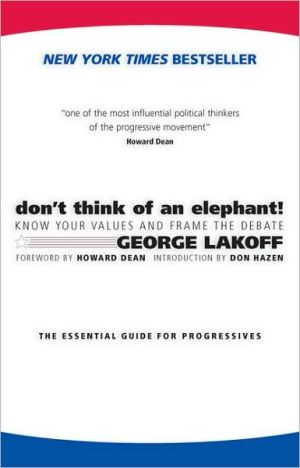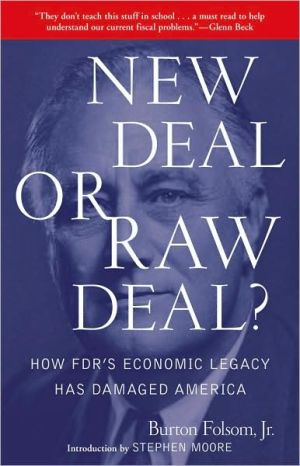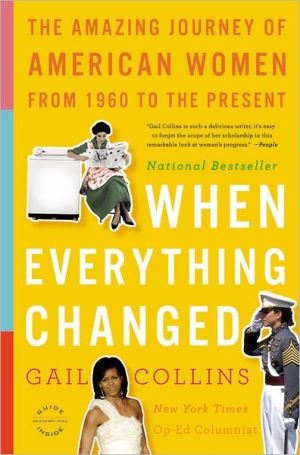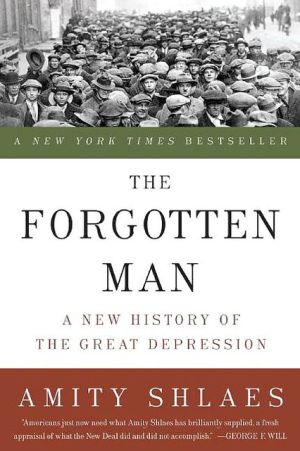Don't Think of an Elephant!: Know Your Values and Frame the Debate: The Essential Guide for Progressives
Don't Think of an Elephant! is the definitive handbook for understanding what happened in the 2004 election and communicating effectively about key issues facing America today. Author George Lakoff has become a key advisor to the Democratic party, helping them develop their message and frame the political debate.\ In this book Lakoff explains how conservatives think, and how to counter their arguments. He outlines in detail the traditional American values that progressives hold, but are...
Search in google:
Lakeoff (cognitive science and linguistics, U. of California, Berkeley) examines the ways US conservatives use language to create "frames," phrases fully loaded with significance from the American collective cognitive unconscious. He shows how he believes this misappropriation of language creates the context for discussion amongst candidates, parties, and in the media, rather than the real issues. He asserts that progressives and others committed to full public discourse must learn when it is used, and how to use it themselves to level the playing field. This volume does not include an index or a bibliography. Annotation ©2004 Book News, Inc., Portland, OR
Framing 101: How to Take Back Public Discourse\ — january 21, 2004 —\ On this date I spoke extemporaneously to a group of about two hundred progressive citizen-activists in Sausalito, California.\ When I teach the study of framing at Berkeley, in Cognitive Science 101, the first thing I do is I give my students an exercise. The exercise is: Don’t think of an elephant! Whatever you do, do not think of an elephant. I’ve never found a student who is able to do this. Every word, like elephant, evokes a frame, which can be an image or other kinds of knowledge: Elephants are large, have floppy ears and a trunk, are associated with circuses, and so on. The word is defined relative to that frame. When we negate a frame, we evoke the frame.\ Richard Nixon found that out the hard way. While under pressure to resign during the Watergate scandal, Nixon addressed the nation on TV. He stood before the nation and said, “I am not a crook.” And everybody thought about him as a crook.\ This gives us a basic principle of framing, for when you are arguing against the other side: Do not use their language. Their language picks out a frame—and it won’t be the frame you want.\ Let me give you an example. On the day that George W. Bush arrived in the White House, the phrase tax relief started coming out of the White House. It still is: It was used a number of times in this year’s State of the Union address, and is showing up more and more in preelection speeches four years later.\ Think of the framing for relief. For there to be relief there must be an affliction, an afflicted party, and a reliever who removes the affliction and is therefore a hero. And if people try to stop the hero, those people are villains for trying to prevent relief.\ When the word tax is added to relief, the result is a metaphor: Taxation is an affliction. And the person who takes it away is a hero, and anyone who tries to stop him is a bad guy. This is a frame. It is made up of ideas, like affliction and hero. The language that evokes the frame comes out of the White House, and it goes into press releases, goes to every radio station, every TV station, every newspaper. And soon the New York Times is using tax relief. And it is not only on Fox; it is on CNN, it is on NBC, it is on every station because it is “the president’s tax-relief plan.” And soon the Democrats are using tax relief—and shooting themselves in the foot.\ It is remarkable. I was asked by the Democratic senators to visit their caucus just before the president’s tax plan was to come up in the Senate. They had their version of the tax plan, and it was their version of tax relief. They were accepting the conservative frame. The conservatives had set a trap: The words draw you into their worldview.\ That is what framing is about. Framing is about getting language that fits your worldview. It is not just language. The ideas are primary— and the language carries those ideas, evokes those ideas.\ There was another good example in the State of the Union address in January. This one was a remarkable metaphor to find in a State of the Union address. Bush said, “We do not need a permission slip to defend America.” What is going on with a permission slip? He could have just said, “We won’t ask permission.” But talking about a permission slip is different. Think about when you last needed a permission slip. Think about who has to ask for a permission slip. Think about who is being asked. Think about the relationship between them.\ Those are the kinds of questions you need to ask if you are to understand contemporary political discourse. While you are contemplating them, I want to raise other questions for you.\ My work on politics began when I asked myself just such a question. It was back in the fall of 1994. I was watching election speeches and reading the Republicans’ “Contract with America.” The question I asked myself was this: What do the conservatives’ positions on issues have to do with each other? If you are a conservative, what does your position on abortion have to do with your position on taxation? What does that have to do with your position on the environment? Or foreign policy? How do these positions fit together? What does being against gun control have to do with being for tort reform? What makes sense of the linkage? I could not figure it out. I said to myself, These are strange people. Their collection of positions makes no sense. But then an embarrassing thought occurred to me. I have exactly the opposite position on every issue. What do my positions have to do with one another? And I could not figure that out either.\ That was extremely embarrassing for someone who does cognitive science and linguistics.\ Eventually the answer came. And it came from a very unexpected place. It came from the study of family values. I had asked myself why conservatives were talking so much about family values. And why did certain values count as “family values” while others did not? Why would anyone in a presidential campaign, in congressional campaigns, and so on, when the future of the world was being threatened by nuclear proliferation and global warming, constantly talk about family values?\ At this point I remembered a paper that one of my students had written some years back that showed that we all have a metaphor for the nation as a family. We have Founding Fathers. The Daughters of the American Revolution. We “send our sons” to war. This is a natural metaphor because we usually understand large social groups, like nations, in terms of small ones, like families or communities.\ Given the existence of the metaphor linking the nation to the family, I asked the next question: If there are two different understandings of the nation, do they come from two different understandings of family?\ I worked backward. I took the various positions on the conservative side and on the progressive side and I said, “Let’s put them through the metaphor from the opposite direction and see what comes out.” I put in the two different views of the nation, and out popped two different models of the family: a strict father family and a nurturant parent family. You know which is which.\ Now, when I first did this—and I’ll tell you about the details in a minute—I was asked to give a talk at a linguistics convention. I decided I would talk about this discovery. In the audience were two members of the Christian Coalition who were linguists and good friends of mine. Excellent linguists. And very, very good people. Very nice people. People I liked a lot. They took me aside at the party afterward and said, “Well, this strict father model of the family, it’s close, but not quite right. We’ll help you get the details right. However, you should know all this. Have you read Dobson?”\ I said, “Who?”\ They said, “James Dobson.”\ I said, “Who?”\ They said, “You’re kidding. He’s on three thousand radio stations.”\ I said, “Well, I don’t think he’s on NPR. I haven’t heard of him.”\ They said, “Well, you live in Berkeley.”\ “Where would I . . . does he write stuff?”\ “Oh,” they said, “oh yes. He has sold millions of books. His classic is Dare to Discipline.”\ My friends were right. I followed their directions to my local Christian bookstore, and there I found it all laid out: the strict father model in all its details. Dobson not only has a 100-to-200- million-dollar-a-year operation, but he also has his own ZIP code, so many people are writing to order his books and pamphlets. He is teaching people how to use the strict father model to raise their kids, and he understands its connection to rightwing politics.\ The strict father model begins with a set of assumptions:\ The world is a dangerous place, and it always will be, because there is evil out there in the world. The world is also difficult because it is competitive. There will always be winners and losers. There is an absolute right and an absolute wrong. Children are born bad, in the sense that they just want to do what feels good, not what is right. Therefore, they have to be made good.\ What is needed in this kind of a world is a strong, strict father who can:\ \ Protect the family in the dangerous world,\ Support the family in the difficult world, and\ Teach his children right from wrong.\ \ What is required of the child is obedience, because the strict father is a moral authority who knows right from wrong. It is further assumed that the only way to teach kids obedience—that is, right from wrong— is through punishment, painful punishment, when they do wrong. This includes hitting them, and some authors on conservative child rearing recommend sticks, belts, and wooden paddles on the bare bottom. Some authors suggest this start at birth, but Dobson is more liberal. “There is no excuse for spanking babies younger than fifteen or eighteen months of age” (Dobson, The New Dare to Discipline, 65).\ The rationale behind physical punishment is this: When children do something wrong, if they are physically disciplined they learn not to do it again. That means that they will develop internal discipline to keep themselves from doing wrong, so that in the future they will be obedient and act morally. Without such punishment, the world will go to hell. There will be no morality.\ Such internal discipline has a secondary effect. It is what is required for success in the difficult, competitive world. That is, if people are disciplined and pursue their self-interest in this land of opportunity, they will become prosperous and self-reliant. Thus, the strict father model links morality with prosperity. The same discipline you need to be moral is what allows you to prosper. The link is the pursuit of self-interest. Given opportunity and discipline, pursuing your self-interest should enable you to prosper.\ Now, Dobson is very clear about the connection between the strict father worldview and free market capitalism. The link is the morality of self-interest, which is a version of Adam Smith’s view of capitalism. Adam Smith said that if everyone pursues their own profit, then the profit of all will be maximized by the invisible hand—that is, by nature—just naturally. Go about pursuing your own profit, and you are helping everyone.\ This is linked to a general metaphor that views well-being as wealth. For example, if I do you a favor, you say, “I owe you one” or “I’m in your debt.” Doing something good for someone is metaphorically like giving him money. He “owes” you something. And he says, “How can I ever repay you?”\ Applying this metaphor to Adam Smith’s “law of nature,” if everyone pursues her own self-interest, then by the invisible hand, by nature, the self-interest of all will be maximized. That is, it is moral to pursue your self-interest, and there is a name for those people who do not do it. The name is do-gooder. A do-gooder is someone who is trying to help someone else rather than herself and is getting in the way of those who are pursuing their self-interest. Do-gooders screw up the system.\ In this model there is also a definition of what it means to become a good person. A good person—a moral person—is someone who is disciplined enough to be obedient, to learn what is right, do what is right and not do what is wrong, and to pursue her self-interest to prosper and become self-reliant. A good child grows up to be like that. A bad child is one who does not learn discipline, does not function morally, does not do what is right, and therefore is not disciplined enough to become prosperous. She cannot take care of herself and thus becomes dependent.\ When the good children are mature, they either have learned discipline and can prosper, or have failed to learn it. From this point on the strict father is not to meddle in their lives. This translates politically into no government meddling.\ Consider what all this means for social programs. It is immoral to give people things they have not earned, because then they will not develop discipline and will become both dependent and immoral. This theory says that social programs are immoral because they make people dependent. Promoting social programs is immoral. And what does this say about budgets? Well, if there are a lot of progressives in Congress who think that there should be social programs, and if you believe that social programs are immoral, how do you stop these immoral people?\ It is quite simple. What you have to do is reward the good people—the ones whose prosperity reveals their discipline and hence their capacity for morality—with a tax cut, and make it big enough so that there is not enough money left for social programs. By this logic, the deficit is a good thing. As Grover Norquist says, it “starves the beast.”\ Where liberals and fiscal conservatives take Bush’s huge deficit as bad, right-wing radicals following strict father morality see it as good. In the State of the Union address in January 2004, the president said that he thinks they can cut the deficit in half by cutting out “wasteful spending”—that is, spending for “bad” social programs. Are conservatives against all government? No. They are not against the military, they are not against homeland defense, they are not against the current Department of Justice, nor against the courts, nor the Departments of Treasury and Commerce. There are many aspects of government that they like very much. They are not against government subsidies for industry. Subsidies for corporations, which reward the good people—the investors in those corporations—are great. No problem there.\ But they are against nurturance and care. They are against social programs that take care of people. That is what they see as wrong. That is what they are trying to eliminate on moral grounds. That is why they are not merely a bunch of crazies or mean and greedy—or stupid—people, as many liberals believe. What is even scarier is that conservatives believe it. They believe it is moral. And they have supporters around the country. People who have strict father morality and who apply it to politics are going to believe that this is the right way to govern.\ Think for a minute about what this says about foreign policy. Suppose you are a moral authority. As a moral authority, how do you deal with your children? Do you ask them what they should do or what you should do? No. You tell them. What the father says, the child does. No back talk. Communication is one-way. It is the same with the White House. That is, the president does not ask; the president tells. If you are a moral authority you know what is right, you have power, and you use it. You would be immoral yourself if you abandoned your moral authority.\ Map this onto foreign policy, and it says that you cannot give up sovereignty. The United States, being the best and most powerful country in the world—a moral authority—knows the right thing to do. We should not be asking anybody else.
ForewordIntroductionPreface : reframing is social change1Framing 101 : how to take back public discourse32Enter the terminator!353What's in a word? : plenty, if it's marriage464Metaphors of terror525Metaphors that kill696Betrayal of trust : beyond lying757What the right wants818What unites progressives899FAQ9610How to respond to conservatives111








